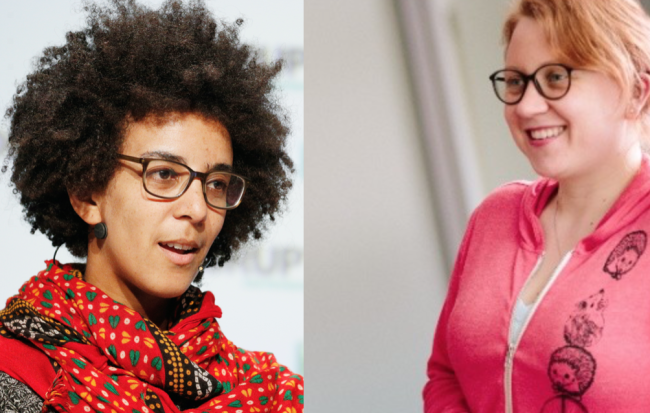You have /5 articles left.
Sign up for a free account or log in.

Timnit Gebru, left, and Margaret Mitchell
Wikimedia Commons, Twitter
The Association for Computing Machinery nixed Google as a sponsor for the fourth annual Conference on Fairness, Accountability and Transparency, happening this week online. The association had been facing pressure to address recent events at Google -- namely the departure of two female computer scientists who called out bias in artificial intelligence and within the company.
Conference sponsorship co-chair Michael Ekstrand, assistant professor of computer science at Boise State University, said via email Monday that the event's Executive Committee “concluded it was in the best interests of the community to pause the sponsorship relationship with Google while we revisit the sponsorship policy.” This means that Google is not included as a sponsor for the conference, he continued, “but has no other impact -- researchers employed by Google are welcome to attend and present their work at the conference.”
Ekstrand said the association isn’t commenting on financial details, including whether the association refunded Google, which was until recently still a sponsor.
Timnit Gebru, former co-lead of Google’s ethical AI team, abruptly left the company in December. She said she’d been fired after executives wanted to censor an unpublished paper she’d co-authored with academics about the ethical and environmental risks of large language model AI. These models “learn” from oodles of text data and are crucial to the work that Google does.
Google, which had argued that Gebru’s paper ignored important bias mitigation developments within AI, disputed Gebru’s account, saying that it had accepted her threatened resignation after conversations about the paper. The company offered something of an apology, saying it’s working hard to improve “representation and inclusiveness” across its research teams.
The explanation didn’t sit well with many employees and outside computer scientists, who said Google failed to live up to its stated values about diversity in firing, effectively or directly, Gebru, a Black woman who researched ethical technology.
Others questioned Google's rationale for questioning the paper in the first place, asking if researchers enjoyed the corporate version of academic freedom or not. Sociologist and technology writer Zeynep Tufekci, for instance, tweeted at Jeff Dean, a Google AI executive, "I often heard from Googlers that pre-publishing 'review' was primarily about preserving Google's intellectual property, and that they essentially had academic freedom. You're saying this isn't the case? If Timnit's paper was weak, why not trust academic review? Or just respond?"
According to an employee-led petition signed by hundreds more academics, Black women make up less than 2 percent of Google’s employees.
“Dr. Gebru is a pathbreaking scientist doing some of the most important work to ensure just and accountable AI and to create a welcoming and diverse AI research field,” the petition says. “The termination is an act of retaliation against Dr. Gebru, and it heralds danger for people working for ethical and just AI -- especially Black people and People of Color -- across Google.”
Last month, Google also allegedly fired Gebru’s former co-lead on ethical AI, Margaret Mitchell. Mitchell said on Twitter that she’d written an email to Google about Gebru’s termination and its relationship to sexism and discrimination -- and then promptly had her own work email access cut off. Google later fired her.
Google has said it terminated Mitchell, who is white, for violating company policies; Axios previously reported that Google was investigating Mitchell for collecting information about how it treated Gebru.
Many Google workers are still advocating internally and publicly for Gebru and Mitchell, who are not alone in complaining about a poor climate for inclusion. NBC reported that when numerous Google employees talked to human resources about racism or sexism at work, they were referred to mental health counseling or encouraged to take medical leave.
Google did not immediately respond to a question about the sponsorship change.
A Google employee group called Google Walkout for Change said in a Medium post Monday that now is “a watershed moment for the tech industry, with implications that reach far beyond it.”
Google is “not committed to making itself better,” the post says, “and has to be held accountable by organized workers with the unwavering support of social movements, civil society, and the research community beyond.”
Accordingly, Google Walkout called on academic conferences to require publication approval policies along with papers from submitting organizations and to refuse to review papers that have been “subjected to editing by lawyers or similar corporate representatives.” This is something like a conflict of interest policy for academic publications, but less common.
The statement also calls on academic institutions and other research organizations -- especially those with a "human-centered" focus -- to publicly commit to "stop receiving funding from Google until it commits to clear and externally enforced and validated standards of research integrity." Too many colleges and universities are "inextricably tied to Google," along with other tech companies, it says.
Academic conferences also should decline sponsorship from organizations “such as Google engaged in retaliatory actions towards researchers,” the group said, recalling the ACM's decision. “We must stand up together now, or the precedent we set for the field -- for the integrity of our own research and for our ability to check the power of big tech -- bodes a grim future for us all.”





